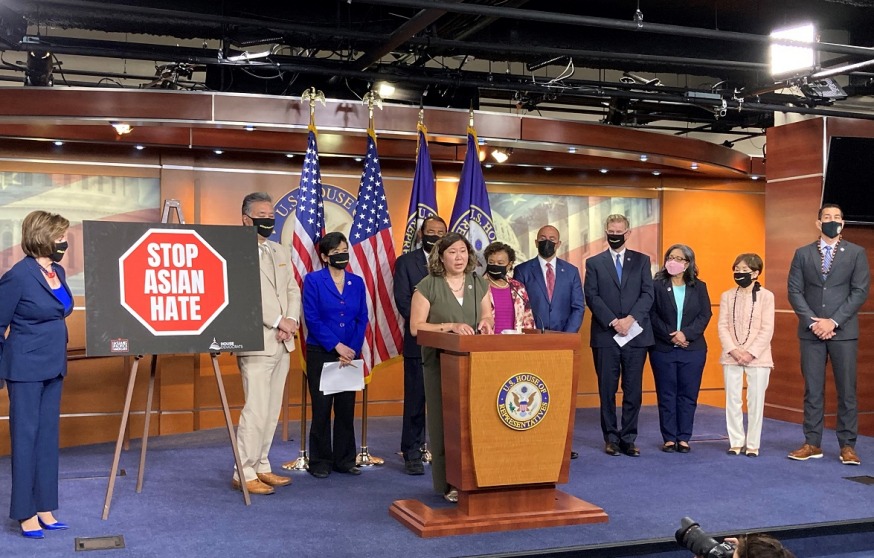
Glenn Magpantay at the 2016 Gay City News Impact Awards. (Photo by Donna Aceto)
Sept. 28, 2023 By Iryna Shkurhan
The U.S Commission on Civil Rights released a first of its kind report examining anti-Asian racism trends and the federal government’s role on Sept. 26.
Long-time civil rights attorney and Jackson Heights resident Glenn Magpantay was appointed to the eight-person commission, which compiled the report, by U.S. Rep. Grace Meng and Sen.Chuck Schumer earlier this year. As a Filipino American, he is the only Pacific Islander on the commission. He also brings over 30 years of experience as an LGBTQ rights activist.
“As the only Asian American Pacific Islander currently serving on the Commission, this report has a deep personal connection to me,” said Magpantay. “I am the survivor of a hate crime for being gay from 25 years ago and the victim of a hate crime for being Asian from 25 months ago. I look forward to continuing working closely with both of their offices, in my role as a commissioner to further promote civil rights for all.”
The over 300 page report, titled “The Federal Response to Anti-Asian Racism in the United States,” goes over findings pertaining to the magnitude and severity of hate crimes against people of Asian descent across the country. It also offers actionable steps that prosecutors, first responders and members of Congress can take. Increasing language access in all levels of government for individuals with limited English proficiency is one recommendation put forward by the commission.
“I am deeply appreciative to the U.S. Commission on Civil Rights (USCCR) for examining the rise in anti-Asian racism for the first time in its history, and for being responsive to the rise in anti-Asian hate that our community experienced when the COVID-19 pandemic started,” said Rep. Meng, who has a track record of passing legislation that combats anti-Asian racism.
Meng introduced the COVID-19 Hate Crimes Act in 2021 following a spike in anti-Asian hate crimes at the onset of the pandemic. President Biden signed the bill, which passed with wide bipartisan support in the Senate and Congress, months later in May. The bill hoped to empower various community members to come forward with hate crime reports while encouraging incident reporting in multiple languages. Since its passage, the Department of Justice hired its first ever Language Access Coordinator and allocated millions for state-run hate-crime reporting hotlines and community-based approaches to combat the issue.

Rep. Grace Meng discusses the passage of her COVID-19 Hate Crimes Act on Capitol Hill Tuesday, May 18, during a press conference (Photo courtesy of Grace Meng’s office)
The report first discusses the history of Asian-American laws in the U.S to contextualize how anti-asian racism was able to grow during the pandemic. It also points out that a lack of comprehensive federal data has impeded their efforts. The commission pushes for federal agencies to submit hate crime figures, and for both law enforcement and prosecutors to vigorously prosecute incidents with the clear understanding of what constitutes a hate crime.
“I also want to acknowledge my constituent, Commissioner Glenn Magpantay, for all his hard work. We owe a tremendous debt of gratitude to him and all the U.S.C.C.R. commissioners for elevating this important issue,” added Meng.
Magpantay also co-founded and served as the executive director of the National Queer Asian Pacific Islander Alliance and as the democracy program director for the Asian American Legal Defense and Education Fund. He also teaches Asian American studies and civil rights at CUNY Hunter College. As a Soros Equality Fellow, he has worked to document the history of LGBTQ Asian-American community building.
The independent commission was created by the Civil Rights Act of 1957. Those who are appointed to the United States Commision on Civil Rights serve for six year terms. Four of the eight commissioners are appointed by the president while the rest are put forward by congressional leaders. No more than four members can identify with the same political party to keep the commission bipartisan.
“I am proud to have recommended the exceptional Glenn Magpantay for the United States Commission on Civil Rights, and I commend the Commission’s newly released report on the federal response to anti-Asian racism,” said Schumer.” He and the whole Commission have examined the rise in anti-Asian hate crimes and recommended actions that can be taken to stem this tide of intolerance, building upon the tools and guidance laid out in the COVID-19 Hate Crimes Act, that I was proud to champion and pass.”






